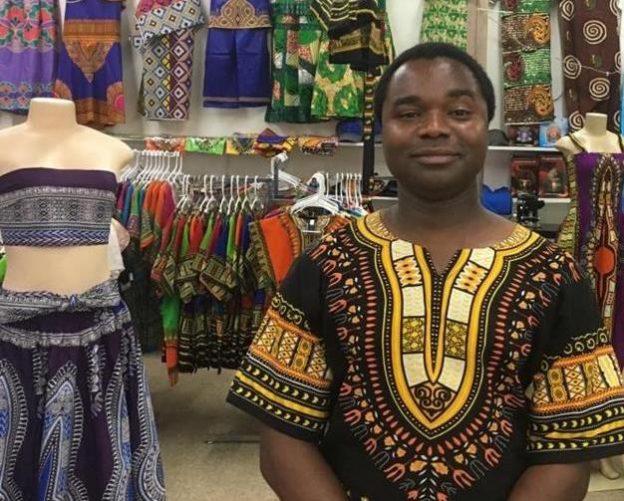(Editor’s note: This article first appeared on the LISC Phoenix website.)
Perodin Bideri, a west Phoenix shop owner who was raised in refugee camps in Tanzania, and Christy Moore, a veteran Valley nonprofit executive who is on a mission to disrupt the landromat industry, are in the same boat.
Both are seeing things — opportunities, specifically. Both have a brand of ambition that’s engaging and inspiring; it invites participation.
And both are navigating waves of success that often come with access to capital made possible through a partnership with nonprofits LISC and Kiva, an online crowdfunding platform. For as little as $25, a lender can join a fund that allows borrowers to receive loans of up to $10,000.
Access to capital is a major hurdle for emerging small-business owners. They don’t qualify for credit from traditional lenders. If they do secure loans, they come with high interest rates and fees.
With a Kiva loan, borrowers pay zero interest and no fees. That got the attention of Bideri, owner of B&R African Styles.
“When I was introduced to Kiva, it was a great opportunity to open doors that grow my business,” Bideri said. “To get a loan with zero interest? I was in.”
Kiva borrowers go through a social underwriting process. They can’t tap into the global Kiva lender network until 20 of their supporters contribute $25 to their loan and a local trustee vouches for the borrowers’ character and business viability. LISC matches the contributions, helps find trustees and provides technical assistance.
Kiva’s inspiration comes from Muhammad Yunus, whose work in microfinance to address poverty in Bangladesh earned him a Nobel Prize. Kiva is a startup that launched with the idea that social-impact investors would be interested in a loan fund that would have impact on underserved individuals and communities.
LISC saw the potential for Kiva loans to spur growth and development in the communities where it works. Phoenix is among the LISC offices now partnering with Kiva to offer microcredits to small businesses.
“Kiva is a great option for entrepreneurs in our commercial corridors,” said Terry Benelli, LISC Phoenix Executive Director. “That’s why Trellis, Phoenix Revitalization Corporation and other local partners have signed on to become trustees who can vouch for business owners in their communities.”
Bideri arrived in Phoenix as a teenager who knew little English. Before starting his business in 2015, he received training at the Phoenix Job Corps Center and earned an associate’s degree in business and business administration from Gateway Community College.
B&R African Styles has grown from a door-to-door sales operation to a shop, featuring African heritage products. A $10,000 Kiva loan will help the business expand its inventory, do some marketing and provide sales training for employees.
Bideri said he sees opportunity for business grow. His goal is to open more shops and hire more people. He wants to develop partnerships with other businesses locally and in the international marketplace. He wants to pass a business legacy to his children.
“People say, ‘You either go big or go home.’ I don’t want to go home,” Bideri said. “I want to go big. That’s the goal. … Because of (Kiva and LISC), I’m making it happen.”
Moore, founder and owner of Social Spin, also is making things happen. A social worker by training, she models conscious capitalism with a business model that invests in customers and the community as a way to improve the bottom line.
Kiva is part of a mix of loans, crowd-funding and in-kind support that helped Social Spin, which features self-serve laundry and wash & fold services, open for business this year. Moore learned about LISC Phoenix and Kiva’s partnership through a social media post by Benelli. Moore made a $25 contribution to the Kiva loan launch of Sandra Flores, owner of Azukar Coffee, a year-old shop in south Phoenix.
Social Spin’s business plan is a neighborhood solution to address the “systemic lack of dignity” in retail and service business in underserved neighborhoods, Moore said. Nowhere is that more evident in typical laundromats, she said. Her survey of Valley laundromats often found those facilities were dingy, uninviting, poorly equipped, and not well-maintained.
Social Spins first location in central Phoenix is well on its way to becoming a social hub for the residents near 24th Street and Thomas Road. The self-serve laundromat is a sharing space for information and organizing as well as a site for workforce development for opportunity youth. Once a week there’s in-house DJ. Organizations like Friendly House and Phoenix Center for the Arts help with programming the space.
Moore used a $5,000 Kiva loan for startup expenses related to renovations of the facility and signage. A second location is in the works in Mesa.
“This is beautiful,” she said of the renovated space and the new vibe created by Social Spin. “There’s a lot of work still to do, but there definitely are no regrets.”
